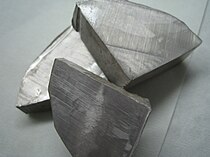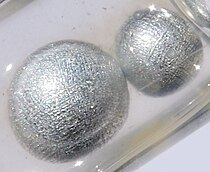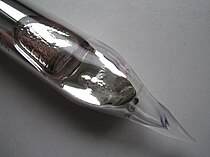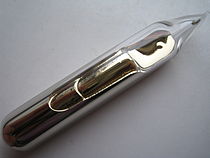କ୍ଷାରୀୟ ଧାତୁ
କ୍ଷାରୀୟ ଧାତୁ ଗୁଡ଼ିକ ([alkali metals; ଆଲ୍କାଲି ମେଟାଲ୍ସ୍] Error: {{Lang-xx}}: text has italic markup (help)) ପର୍ଯ୍ୟାୟ ସାରଣୀରେ ଥିବା ଏକ ଶ୍ରେଣୀ । ଏହି ଶ୍ରେଣୀରେ ଥିବା ମୌଳିକଗୁଡ଼ିକ ହେଲା: ଲିଥିଅମ୍ (Li), ସୋଡିଅମ୍ (Na),[note ୧] ପୋଟାସିଅମ୍ (K),[note ୨] ରୁବିଡିଅମ୍ (Rb), ସିଜିଅମ୍ (Cs),[note ୩] and ଫ୍ରନ୍ସିଅମ୍ (Fr) ।[୪] ଏହି ଶ୍ରେଣୀଟି ପର୍ଯ୍ୟାୟ ସାରଣୀରେ ଏସ୍-ଖଣ୍ଡ (S-block) ଅନ୍ତର୍ଗତ ।[୫]
| Alkali metals | |||||||||||||||||||||||||||||||||||||||||||||||||||||||||||||||||||||||||||||||||||||||||||||||||||||||||||||||||||||||||||||||||||||||||||||||||||||||||||||||||||||||||||||||||||||||||||||||||||||||||||||||||||||||||||||||||
|---|---|---|---|---|---|---|---|---|---|---|---|---|---|---|---|---|---|---|---|---|---|---|---|---|---|---|---|---|---|---|---|---|---|---|---|---|---|---|---|---|---|---|---|---|---|---|---|---|---|---|---|---|---|---|---|---|---|---|---|---|---|---|---|---|---|---|---|---|---|---|---|---|---|---|---|---|---|---|---|---|---|---|---|---|---|---|---|---|---|---|---|---|---|---|---|---|---|---|---|---|---|---|---|---|---|---|---|---|---|---|---|---|---|---|---|---|---|---|---|---|---|---|---|---|---|---|---|---|---|---|---|---|---|---|---|---|---|---|---|---|---|---|---|---|---|---|---|---|---|---|---|---|---|---|---|---|---|---|---|---|---|---|---|---|---|---|---|---|---|---|---|---|---|---|---|---|---|---|---|---|---|---|---|---|---|---|---|---|---|---|---|---|---|---|---|---|---|---|---|---|---|---|---|---|---|---|---|---|---|---|---|---|---|---|---|---|---|---|---|---|---|---|---|---|---|
|
| |||||||||||||||||||||||||||||||||||||||||||||||||||||||||||||||||||||||||||||||||||||||||||||||||||||||||||||||||||||||||||||||||||||||||||||||||||||||||||||||||||||||||||||||||||||||||||||||||||||||||||||||||||||||||||||||||
| |||||||||||||||||||||||||||||||||||||||||||||||||||||||||||||||||||||||||||||||||||||||||||||||||||||||||||||||||||||||||||||||||||||||||||||||||||||||||||||||||||||||||||||||||||||||||||||||||||||||||||||||||||||||||||||||||
| ↓ Period | |||||||||||||||||||||||||||||||||||||||||||||||||||||||||||||||||||||||||||||||||||||||||||||||||||||||||||||||||||||||||||||||||||||||||||||||||||||||||||||||||||||||||||||||||||||||||||||||||||||||||||||||||||||||||||||||||
| 2 | Lithium (Li) 3 | ||||||||||||||||||||||||||||||||||||||||||||||||||||||||||||||||||||||||||||||||||||||||||||||||||||||||||||||||||||||||||||||||||||||||||||||||||||||||||||||||||||||||||||||||||||||||||||||||||||||||||||||||||||||||||||||||
| 3 | Sodium (Na) 11 | ||||||||||||||||||||||||||||||||||||||||||||||||||||||||||||||||||||||||||||||||||||||||||||||||||||||||||||||||||||||||||||||||||||||||||||||||||||||||||||||||||||||||||||||||||||||||||||||||||||||||||||||||||||||||||||||||
| 4 | Potassium (K) 19 | ||||||||||||||||||||||||||||||||||||||||||||||||||||||||||||||||||||||||||||||||||||||||||||||||||||||||||||||||||||||||||||||||||||||||||||||||||||||||||||||||||||||||||||||||||||||||||||||||||||||||||||||||||||||||||||||||
| 5 | Rubidium (Rb) 37 | ||||||||||||||||||||||||||||||||||||||||||||||||||||||||||||||||||||||||||||||||||||||||||||||||||||||||||||||||||||||||||||||||||||||||||||||||||||||||||||||||||||||||||||||||||||||||||||||||||||||||||||||||||||||||||||||||
| 6 | Caesium (Cs) 55 | ||||||||||||||||||||||||||||||||||||||||||||||||||||||||||||||||||||||||||||||||||||||||||||||||||||||||||||||||||||||||||||||||||||||||||||||||||||||||||||||||||||||||||||||||||||||||||||||||||||||||||||||||||||||||||||||||
| 7 | Francium (Fr) 87 | ||||||||||||||||||||||||||||||||||||||||||||||||||||||||||||||||||||||||||||||||||||||||||||||||||||||||||||||||||||||||||||||||||||||||||||||||||||||||||||||||||||||||||||||||||||||||||||||||||||||||||||||||||||||||||||||||
|
Legend
| |||||||||||||||||||||||||||||||||||||||||||||||||||||||||||||||||||||||||||||||||||||||||||||||||||||||||||||||||||||||||||||||||||||||||||||||||||||||||||||||||||||||||||||||||||||||||||||||||||||||||||||||||||||||||||||||||
ଧର୍ମ
ସମ୍ପାଦନାଭୌତିକ
ସମ୍ପାଦନାରସାୟନିକ
ସମ୍ପାଦନାନ୍ୟୁକ୍ଲିୟ
ସମ୍ପାଦନାଇତିହାସ
ସମ୍ପାଦନାଆବିଷ୍କାର
ସମ୍ପାଦନାଉପସ୍ଥିତି
ସମ୍ପାଦନାଉତ୍ପାଦନ
ସମ୍ପାଦନାବ୍ୟବହାର
ସମ୍ପାଦନାଟୀକା
ସମ୍ପାଦନା- ↑ The symbol Na for sodium is derived from its Latin name, natrium; this is still the name for the element in some languages, such as German and Russian. In early English texts, the symbol So for the English name sodium is sometimes seen; this is wholly obsolete.
- ↑ The symbol K for potassium is derived from its Latin name, kalium; this is still the name for the element in some languages, such as German and Russian. In early English texts, the symbol Po for the English name potassium is sometimes seen; this is wholly obsolete, and presently would collide with the symbol for polonium (also Po).
- ↑ Caesium is the spelling recommended by the International Union of Pure and Applied Chemistry (IUPAC).[୧] The American Chemical Society (ACS) has used the spelling cesium since 1921,[୨][୩] following Webster’s Third New International Dictionary.
ଆଧାର
ସମ୍ପାଦନା- ↑ International Union of Pure and Applied Chemistry (2005). Nomenclature of Inorganic Chemistry (IUPAC Recommendations 2005). Cambridge (UK): RSC–IUPAC. ISBN 0-85404-438-8. pp. 248–49. Electronic version..
- ↑ Coghill, Anne M.; Garson, Lorrin R., eds. (2006). The ACS Style Guide: Effective Communication of Scientific Information (3rd ed.). Washington, D.C.: American Chemical Society. p. 127. ISBN 0-8412-3999-1..
- ↑ Coplen, T. B.; Peiser, H. S. (1998). "History of the recommended atomic-weight values from 1882 to 1997: a comparison of differences from current values to the estimated uncertainties of earlier values" (PDF). Pure Appl. Chem. 70 (1): 237–257. doi:10.1351/pac199870010237..
- ↑ International Union of Pure and Applied Chemistry (2005). Nomenclature of Inorganic Chemistry (IUPAC Recommendations 2005). Cambridge (UK): RSC–IUPAC. ISBN 0-85404-438-8. pp. 51. Electronic version..
- ↑ Leach, Mark R. (1999–2012). "The Internet Database of Periodic Tables". meta-synthesis.com. Retrieved 20 May 2012.
ଆହୁରି ପଢନ୍ତୁ
ସମ୍ପାଦନା- Bauer, Brent A., Robert Houlihan, Michael J. Ackerman, Katya Johnson, and Himeshkumar Vyas (2006). "Acquired Long QT Syndrome Secondary to Cesium Chloride Supplement". Journal of Alternative and Complementary Medicine. 12 (10): 1011–1014. doi:10.1089/acm.2006.12.1011. PMID 17212573.
{{cite journal}}: CS1 maint: multiple names: authors list (link) - Campbell, Linda M., Aaron T. Fisk, Xianowa Wang, Gunter Kock, and Derek C. Muir (2005). "Evidence for Biomagnification of Rubidium in Freshwater and Marine Food Webs". Canadian Journal of Fisheries and Aquatic Sciences. 62 (5): 1161–1167. doi:10.1139/f05-027.
{{cite journal}}: CS1 maint: multiple names: authors list (link) - Chang, Cheng-Hung, and Tian Y. Tsong (2005). "Stochastic Resonance of Na, K-Ion Pumps on the Red Cell Membrane". AIP Conference Proceedings: 18th International Conference on Noise and Fluctuations. 780. American Institute of Physics. pp. 587–590. doi:10.1063/1.2036821. ISBN 0-7354-0267-1.
- Erermis, Serpil, Muge Tamar, Hatice Karasoy, Tezan Bildik, Eyup S. Ercan, and Ahmet Gockay (1997). "Double-Blind Randomised Trial of Modest Salt Restriction in Older People". Lancet. 350 (9081): 850–854. doi:10.1016/S0140-6736(97)02264-2. PMID 9310603.
{{cite journal}}: CS1 maint: multiple names: authors list (link) - Joffe, Russell T., Stephen T. Sokolov and Anthony J. Levitt (2006). "Lithium and Triiodothyronine Augmentation of Antidepressants". Canadian Journal of Psychiatry. 51 (12): 791–3. PMID 17168254.
{{cite journal}}: CS1 maint: multiple names: authors list (link) - Krachler, M, and E Rossipal (1999). "Trace Elements Transfer From Mother to the Newborn – Investigations on Triplets of Colostrum, Maternal and Umbilical Sera". European Journal of Clinical Nutrition. 53 (6): 486–494. doi:10.1038/sj.ejcn.1600781. PMID 10403586.
{{cite journal}}: CS1 maint: multiple names: authors list (link) - Stein, Benjamin P., Stephen G. Benka, Phillip F. Schewe, and Bertram Schwarzhild (1996). "Physics Update". Physics Today. 49 (6): 9. Bibcode:1996PhT....49f...9S. doi:10.1063/1.2807642.
{{cite journal}}: CS1 maint: multiple names: authors list (link)
ବାହାର ଲିଙ୍କ
ସମ୍ପାଦନା- "Group 1: The Alkali Metals". Visual Elements. Royal Society of Chemistry. Retrieved 8 December 2009.
- Atomic and Physical Properties of the Group 1 Elements An in-depth look at alkali metals
- Alkali Metal Bangs Filmed reactions of five-gram samples of the alkali metals with water
| ପର୍ଯ୍ୟାୟ ସାରଣୀ | ||||||||||||||||||||||||||||||||||||||||||||||||||||||||
|---|---|---|---|---|---|---|---|---|---|---|---|---|---|---|---|---|---|---|---|---|---|---|---|---|---|---|---|---|---|---|---|---|---|---|---|---|---|---|---|---|---|---|---|---|---|---|---|---|---|---|---|---|---|---|---|---|
| ଶ୍ରେଣୀ → | ୧ | ୨ | ୩ | ୪ | ୫ | ୬ | ୭ | ୮ | ୯ | ୧୦ | ୧୧ | ୧୨ | ୧୩ | ୧୪ | ୧୫ | ୧୬ | ୧୭ | ୧୮ | ||||||||||||||||||||||||||||||||||||||
| ↓ ପର୍ଯ୍ୟାୟ | ||||||||||||||||||||||||||||||||||||||||||||||||||||||||
| ୧ | ୧ H |
୨ He | ||||||||||||||||||||||||||||||||||||||||||||||||||||||
| ୨ | ୩ Li |
୪ Be |
୫ B |
୬ C |
୭ N |
୮ O |
୯ F |
୧୦ Ne | ||||||||||||||||||||||||||||||||||||||||||||||||
| ୩ | ୧୧ Na |
୧୨ Mg |
୧୩ Al |
୧୪ Si |
୧୫ P |
୧୬ S |
୧୭ Cl |
୧୮ Ar | ||||||||||||||||||||||||||||||||||||||||||||||||
| ୪ | ୧୯ K |
୨୦ Ca |
୨୧ Sc |
୨୨ Ti |
୨୩ V |
୨୪ Cr |
୨୫ Mn |
୨୬ Fe |
୨୭ Co |
୨୮ Ni |
୨୯ Cu |
୩୦ Zn |
୩୧ Ga |
୩୨ Ge |
୩୩ As |
୩୪ Se |
୩୫ Br |
୩୬ Kr | ||||||||||||||||||||||||||||||||||||||
| ୫ | ୩୭ Rb |
୩୮ Sr |
୩୯ Y |
୪୦ Zr |
୪୧ Nb |
୪୨ Mo |
୪୩ Tc |
୪୪ Ru |
୪୫ Rh |
୪୬ Pd |
୪୭ Ag |
୪୮ Cd |
୪୯ In |
୫୦ Sn |
୫୧ Sb |
୫୨ Te |
୫୩ I |
୫୪ Xe | ||||||||||||||||||||||||||||||||||||||
| ୬ | ୫୫ Cs |
୫୬ Ba |
* |
୭୨ Hf |
୭୩ Ta |
୭୪ W |
୭୫ Re |
୭୬ Os |
୭୭ Ir |
୭୮ Pt |
୭୯ Au |
୮୦ Hg |
୮୧ Tl |
୮୨ Pb |
୮୩ Bi |
୮୪ Po |
୮୫ At |
୮୬ Rn | ||||||||||||||||||||||||||||||||||||||
| ୭ | ୮୭ Fr |
୮୮ Ra |
** |
୧୦୪ Rf |
୧୦୫ Db |
୧୦୬ Sg |
୧୦୭ Bh |
୧୦୮ Hs |
୧୦୯ Mt |
୧୧୦ Ds |
୧୧୧ Rg |
୧୧୨ Cn |
୧୧୩ Uut |
୧୧୪ Fl |
୧୧୫ Uup |
୧୧୬ Lv |
୧୧୭ Uus |
୧୧୮ Uuo | ||||||||||||||||||||||||||||||||||||||
| * ଲାନ୍ଥାନାଇଡ୍ | ୫୭ La |
୫୮ Ce |
୫୯ Pr |
୬୦ Nd |
୬୧ Pm |
୬୨ Sm |
୬୩ Eu |
୬୪ Gd |
୬୫ Tb |
୬୬ Dy |
୬୭ Ho |
୬୮ Er |
୬୯ Tm |
୭୦ Yb |
୭୧ Lu |
|||||||||||||||||||||||||||||||||||||||||
| ** ଅକ୍ଟିନାଇଡ୍ | ୮୯ Ac |
୯୦ Th |
୯୧ Pa |
୯୨ U |
୯୩ Np |
୯୪ Pu |
୯୫ Am |
୯୬ Cm |
୯୭ Bk |
୯୮ Cf |
୯୯ Es |
୧୦୦ Fm |
୧୦୧ Md |
୧୦୨ No |
୧୦୩ Lr | |||||||||||||||||||||||||||||||||||||||||
|
ଏହା ଏକ ୧୮ ଟି ସ୍ତମ୍ବ ବିଶିଷ୍ଟ ପର୍ଯ୍ୟାୟ ସାରଣୀର ରୂପରେଖ ଅଟେ, which has come to be referred to as the common or standard form, on account of its popularity. It is also sometimes referred to as the long form, in comparison to the short form or Mendeleev-style, which omits groups 3–12 by placing their elements into the main groups. The wide periodic table incorporates the lanthanides and the actinides, rather than separating them from the main body of the table. The extended periodic table adds the 8th and 9th periods, including the superactinides. | ||||||||||||||||||||||||||||||||||||||||||||||||||||||||
| ||||||||||||||||||||||||||||||||||||||||||||||||||||||||




